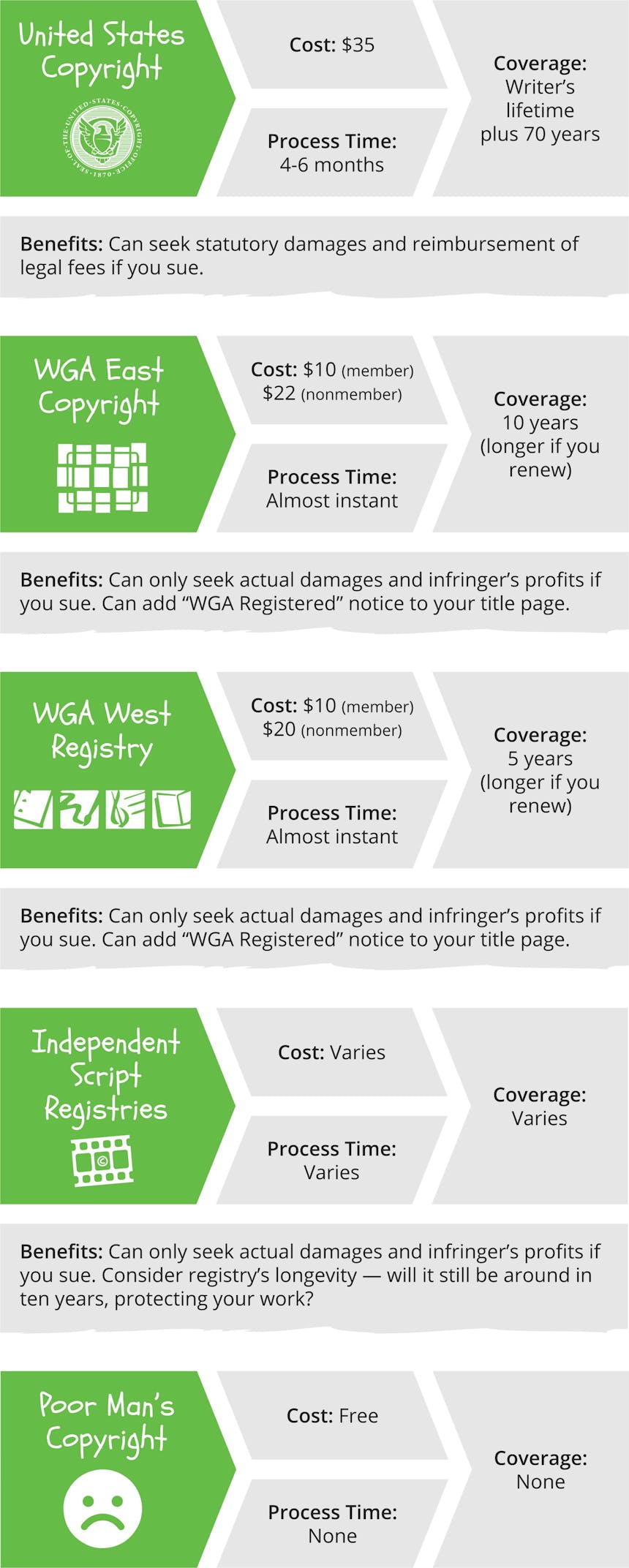With one click
Export a perfectly formatted traditional script.
Please note: SoCreate gathered the following advice from online sources including the U.S. Copyright Office, Writers Guild of America, and Legal Zoom. It is presented for educational purposes only and should not be used as legal advice.
Horror stories circle the screenwriting community: a writer spends months on a brilliant screenplay, submits it to production companies, and gets rejected outright. Ouch. Two years later, an eerily similar movie lands in theaters. And the writer’s heart lands in their stomach. Double ouch.
Whether intentional theft or coincidence is at play, this situation can really sink a screenwriter’s spirits. Some writers even hoard their great work to make sure it doesn’t happen to them! But what’s a screenplay without the chance of production?
So, before you pitch your screenplay, protect yourself. We’ve rounded up some information below to help our screenwriter friends stay safe from greedy thieves.
Export a perfectly formatted traditional script.


Most countries recognize that the moment you create something and execute on it, you own the copyright. However, the timing isn’t so easy to prove. You’ll want an official, third-party time stamp that exists on public record if you’re going to have any luck proving in court that your work was stolen.
The U.S. Copyright Office makes this easy, if you’ve got $35 and 2-10 months to spare. Yes, the processing time is LENGTHY. But so was the process to write your masterpiece, so we think it’s worth the wait.
The official copyright is good until the grim reaper comes knocking, plus 70 years after that.
In the meantime, you should still add “copyright” to your screenplay’s title page, with or without official third-party record. Remember: you wrote it, so you own it. To do this, simply add the word “Copyright” or the copyright symbol, then your name, then the date the material was created. For example:
Copyright Courtney Meznarich, January 2019.
An official U.S. Copyright is your best weapon against thieves if things get real: with this in hand, you can sue for statutory damages and reimbursement of legal fees. Without it, you can only seek actual damages and profits from the infringing party. And if someone steals your baby, you want that money, honey. So, go get that copyright!
Registration with the Writers Guild of America (East or West) does offer some protection. It provides official documentation that you, in fact, wrote your screenplay on a given date. WGA can produce your material as evidence if legal action is initiated. You can also add WGA registration information to your screenplay’s title page, just to put people on notice that you’re not messing around. And, unlike the U.S. Copyright Office, WGA allows you to register any files that can help you prove the work is yours, including but not limited to scripts, treatments, synopses, and outlines.
It’s cheaper than a U.S. Copyright, too ($20-$22 for nonmembers, $10 for members), and processing time is nearly instant. So, if you’re in a hurry to pitch your script, WGA may be a good option for you.
The cons? Registration is only good for 5-10 years (depending on WGA East or WGA West), and you’ll have to pay renewal fees to extend that. And, if you do have the misfortune of ending up in court, it’s unlikely you’ll be able to recoup the cost of your legal fees, or statutory damages, which typically requires a U.S. Copyright.
We’re not sure who’s giving out this advice, but they must not like you very much. “Just put your script in a self-addressed stamped envelope,” they said. “It will prove when your work was written,” they said. No, no, no. This is not a substitute for copyright registration, and we just love screenwriters too much to end this blog without reinforcing this. To protect yourself, involve a reputable third-party.

If you’re writing your script with another person or multiple people, you should also consider writing up a collaborator’s agreement. It could include the following:
Who owns what?
How much will each writer earn, and when?
What will you do if the script doesn’t sell, or if the film isn’t made?
What are the terms of each writer’s contribution?
There are other third-party screenplay registries out there, and they offer a similar service to WGA. But you should research them thoroughly: how long have they been around? Will they still be around in 5 years, and more importantly, will your screenplay still be registered there in 5 years?
Some other ways to protect yourself: be picky about who you share your work with and keep clear records of those interactions. Finally, let’s level with each other: yes, screenplay theft does happen. But it is rare. More often, two (or more) people live similar experiences, in similar times, and write very similar stories. Also, it is so much easier and cheaper for someone to just buy your script, rather than steal it and re-write it. So, let’s not jump to conclusions when a movie pops up that is oh-so-similar to a screenplay we’ve written, because it doesn’t automatically mean it was stolen. But, let’s be ready if that day comes.